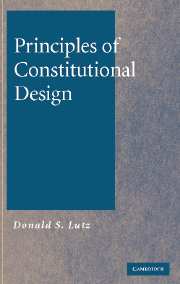Book contents
- Frontmatter
- Contents
- Preface
- Acknowledgments
- Principles of Constitutional Design
- 1 Constitutionalism: An Initial Overview and Introduction
- 2 Sovereignty
- 3 Popular Sovereignty
- 4 The Separation of Powers
- 5 Analyzing the Interaction between Popular Control and the Separation of Powers in the Amendment Process
- 6 Matching a Government to a People
- 7 An Overview of the Constitutional Design Project
- 8 An Underlying Constitutional Logic: Rational Actors?
- Index
2 - Sovereignty
Published online by Cambridge University Press: 29 July 2009
- Frontmatter
- Contents
- Preface
- Acknowledgments
- Principles of Constitutional Design
- 1 Constitutionalism: An Initial Overview and Introduction
- 2 Sovereignty
- 3 Popular Sovereignty
- 4 The Separation of Powers
- 5 Analyzing the Interaction between Popular Control and the Separation of Powers in the Amendment Process
- 6 Matching a Government to a People
- 7 An Overview of the Constitutional Design Project
- 8 An Underlying Constitutional Logic: Rational Actors?
- Index
Summary
The Reality Addressed by Sovereignty
Constitutionalism and, with it, the design of constitutions rest ultimately on an idea that today is rarely used in political analysis and, when it is, is generally misunderstood. That idea is sovereignty. The disuse into which the concept has fallen, and the misuse to which it is sometimes put when not ignored, impoverishes our political discourse at the very point where it should be the richest and most subtle – at the point where justice and power meet in constitutionalism. Constitutionalism is a human creation that results from the interaction between human nature and the brute facts of social existence in a postneolithic world. One brute fact is the absolute need for some form of order in any organized society; another is the inevitable chaos that results when such order is not achieved. Sovereignty is a human creation, an idea that attempts both to denote the factual necessity of order in human society and to connote a preferred way of relating to that fact. The preferred way of relating to the brute facts of social existence connoted by sovereignty is a constitutional order that marries justice with power in such a way as to tame that power and turn it to the service of a civil society.
Constitutionalism is one way of organizing sovereignty, but not the only way.
- Type
- Chapter
- Information
- Principles of Constitutional Design , pp. 26 - 66Publisher: Cambridge University PressPrint publication year: 2006
- 1
- Cited by



